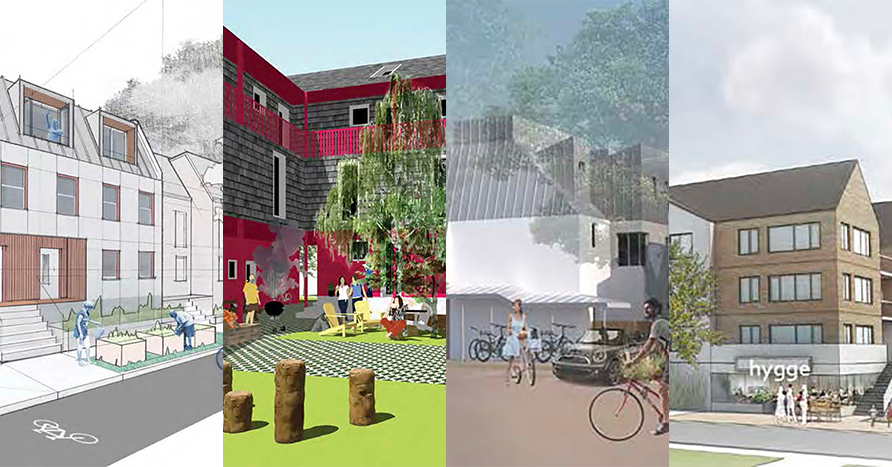The Urbanarium’s Missing Middle Competition
Competition Overview
In 2017, the Urbanarium, a Vancouver based non-profit, held an open design competition to develop and present options for addressing Metro Vancouver’s affordability and social health challenges, with outstanding design and social innovation.
Housing in Vancouver is dominated by high density tower forms and low density single family zones. The Missing Middle competition was held to generate ideas for filling the gap between those two divergent housing types by generating ideas for introducing new types of housing into single family neighbourhoods around Metro Vancouver.
There were four study areas, one each in Vancouver, Port Coquitlam, Burnaby and Surrey. Applicants were assigned one of the study areas randomly. Each study area was around four blocks in size and competitors selected one or two single-family lots to design and provide some contextual assessment based on the study area and municipal plans and by-laws.
The competitors had to address affordability, sociability and design excellence. Central to their work was the creation of pro-forma including revenue, land costs and construction value. This requirement for financial evaluation of proposals was a unique aspect of type of ideas competition. These values are reflected in the Judging Criteria noted below:
- Affordability Innovation: Proposed designs create affordable housing options and specify legal or other tools such as rental covenants needed to support the proposed solutions.
- Social Innovation: Proposals create options for reducing the current crisis of social isolation, and supports interaction between community members.
- Design Innovation: This competition at heart is not a beauty contest, but great design that supports the two core objectives above and is exciting, affordable, and sustainable.
The jury was chaired Bruce Haden, MRAIC, Architect AIBC and included planners, architects, a landscape architect and a cost consultant.
Cash prizes were awarded to First, Second and Third Prize winners and to the recipients of a Planner’s Prize. The latter was selected by an independent subgroup of the jury consisting of three municipal planners from municipalities in Metro Vancouver.
Recommended Policy Changes Resulting from the Entrants
There was a strong consensus amongst the competitors around the required changes in municipal policy that would support the creation of a much greater range of housing options in current single-family neighborhoods. The following material was presented alongside presentations by three of the winning teams, to staff around Metro Vancouver, including Vancouver, Coquitlam, Port Coquitlam, Port Moody and New Westminster as of September 2018.
One Big Principle: We can’t densify out of the affordability challenge
To help address the affordability challenge through densifying single family neighbourhoods we need mechanisms to either extract financial value from densification to support other housing and / or to reduce the market desirability of units through covenants or other means.
Four Essential City Policy Changes:
- Rezone broadly, not in pockets. Rezoning in small areas will simply bump up land values relative to lower zoned neighbours in other areas. Large scale rezoning reduces the risk of NIMBYism and reduces the “lottery winner” phenomenon.
- Mandate a very low (best = zero) number of parking stalls on site. This allows better units, better site plans and lower construction cost. It keeps new units out of the speculative market, encourages transit use and walking. The people hardest hit by the affordability crisis, such as millennials, are least attached to the idea of owning cars. It’s also time to be bold on this issue!
- Make the buildable envelope bigger by reducing required setbacks and increasing allowable height. This allows better units, and way more design options.
- Eliminate the Building Code requirement for Fire Department access through sites, by (among other strategies) allowing addressing off lanes. This change would eliminate the need for a fire protected corridor from street edge to site back. The requirement for this access is a big constraint.
Four Important City Policy Changes:
- Remove implicit and explicit barriers to different forms of social organization such as co-housing and shared multi-generational living. This allows the opportunity to maximize the sharing of space and of financial and non-financial resources
- Reintroduce mixed use in single family zones by allowing both small commercial spaces and live work. We zoned out the corner store – let’s bring it back! And let artists or accountants set up shop as well.
- Reduce the emphasis on privacy of adjacent units as a key design constraint. The constraints on overlook of neighbours create a dramatic impediment to good design in existing neighbourhoods.
- Reduce the emphasis on streetscape character continuity as a key design constraint. The idea that the best streets are where all the buildings look alike is wrong.
This competition focused on small lot interventions, with each entrant working on one of four sites in Vancouver, Port Coquitlam, Surrey or Burnaby in British Columbia, Canada. The sites each consist of four city blocks, two blocks away from major arterials with bus routes and each site is two lots long. Entrants proposed detailed options for redevelopment of 1-2 lots in the assigned neighborhood and a master plan for the 4-city block context area.
This was not about density alone, but rather generating inspiring neighbourhood possibilities for a single lot landowner or a pair of neighbours to create affordable, higher density, low rise options that support socially contributing housing.
(From competition brief)
Bula, Frances, A search for the ‘missing middle’ of housing, The Globe and Mail, 2018, Vancouver
Nithya, Caleb, Affordable housing competition generates ideas for Vancouver, Construction Canada, 2018
Connolly, Joannah, Micro co-op design wins ‘missing middle’ housing competition, Vancouver Is Awesome
Geller, Michael, 'Missing middle' competition offers residential housing solutions, Vancouver Sun
